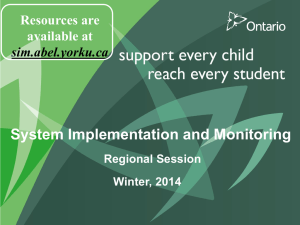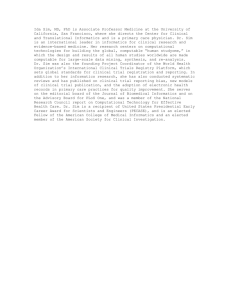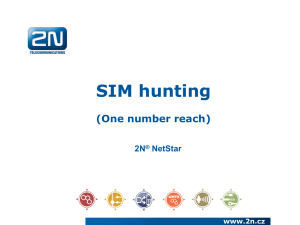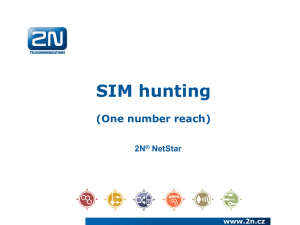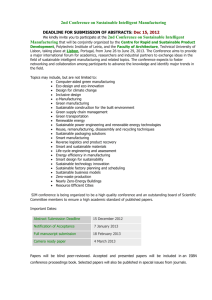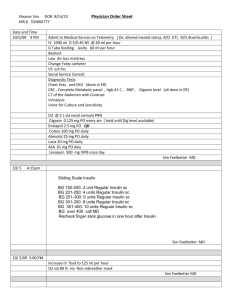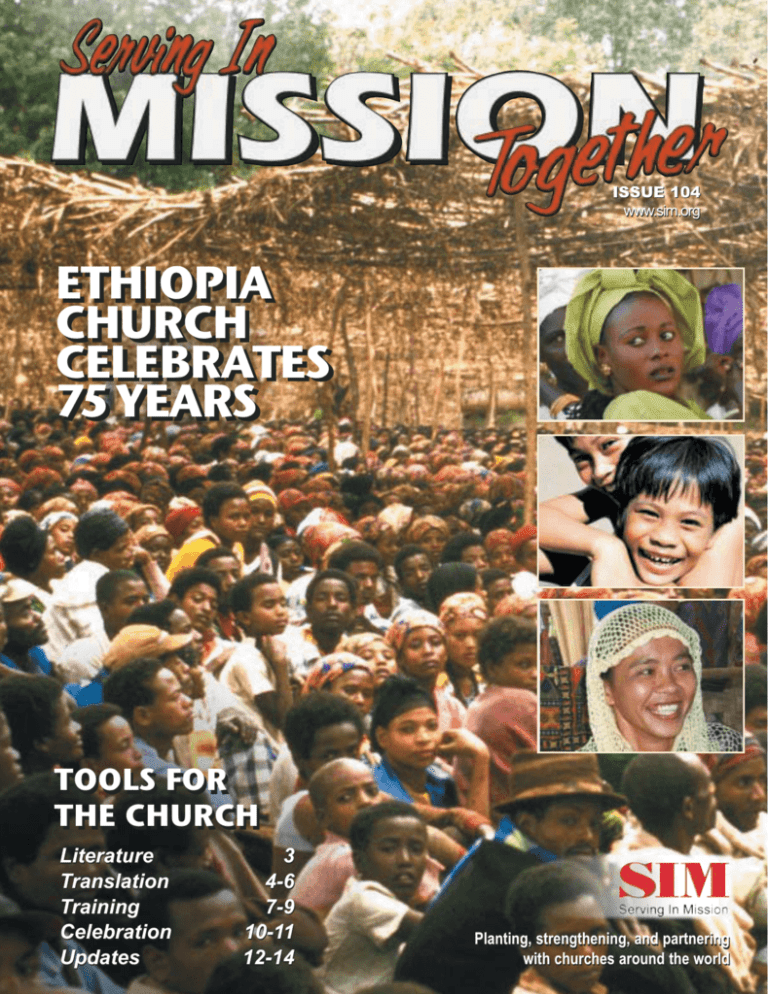
ISSUE 104
www.sim.org
ETHIOPIA
ETHIOPIA
CHURCH
CHURCH
CELEBRATES
CELEBRATES
75
75YEARS
YEARS
TOOLS FOR
THE CHURCH
Literature
Translation
Training
Celebration
Updates
3
4-6
7-9
10-11
12-14
Planting, strengthening, and partnering
with churches around the world
Passing the Baton
by Jim Plueddemann, outgoing International Director
Fledgling movements often begin
and surge forward on the adrenalin
of their founders. But what gives
an organization staying power?
Healthy movements outlive the
charisma of their founders when
they continue to be motivated by
vision. Their motivation is not
based on a person or a tradition,
but on a calling. Vision-driven leadership is not a sprint or even a
marathon—it is a relay race. The
primary role of leadership is to
challenge the movement to be faithful to the vision and then pass the
vision baton to the next leader.
• In a world where everything is chang-
Malcolm McGregor, incoming
International Director, and Jim
Plueddemann don kilts in honor of
their shared Scottish heritage. Malcolm
and his wife Liz have served with SIM
in Ethiopia, and Malcolm has served as
Director of SIM UK for nearly eight
years. More information about the
McGregors is available at
<www.sim.org>.
ing, the glory of God in the worldwide
church is unchanging and eternal.
"May God be given glory in the
church and in Christ Jesus forever
and ever through endless ages.
Amen" (Ephesians 3:21).
• The glory of God in the worldwide
church is the heart of the Gospel.
"Christ gave up his life for the
church to make her clean, washed
by baptism and God's word"
(Ephesians 5: 25-26). Nothing is
more important to Jesus.
• The rulers and authorities in heavenly realms see the wisdom of God
when they see different ethnic
groups together in His church
(Ephesians 3:10).
• All authority is given to Christ for
the benefit of the church
(Ephesians 1:22).
The goals of a general mission are
seldom as alluring as those of specialized missions. It might be easier
to communicate our passion if we
were focused exclusively on radio,
aviation, ministries of mercy and
development, literature, evangelism
or Bible translation. But God has
called SIM to do "all the above”—
and more—within the framework of
our commitment to plant, strengthen, and partner with churches.
SIM's vision is the glory of God in the
worldwide church. And what a glorious vision it is!
Through evangelism God plants the
church. In discipleship the church is
strengthened. And in partnership
we fulfill Christ's commission
together.
The glory of God in the worldwide
church provides a sure foundation
when the world seems to be falling
apart, an anchor in the storms of
life, a lighthouse in the darkness
engulfing the world.
Everything else is open to change.
Who knows what our mission will
look like in another ten years? We
may have very different strategies,
and the majority of our members
may not be from the "western"
world. As our planet becomes
increasingly dangerous, we may
have many SIM martyrs. In the
midst of change, may we never forget our vision. May we become
more and more, in every way, like
Christ who is the head of His body,
the Church (Ephesians 4:15).
As Carol and I pass the vision baton
to Malcolm and Liz, you can be
sure we will be cheering for them
and for you, SIM's partners. Relay
runners don't look idly away after
they pass off the baton! The race
isn't finished until the last runner
finishes the course. We have loved
running this race with you and we'll
continue to surround you with
cheers and with prayer. Let us fix
our eyes on Jesus as we run the race
He has marked out for us.
Issue No. 104. © 2003 by SIM. Official quarterly publication of SIM (Serving In Mission), an interdenominational evangelical Protestant mission. SIM includes Africa Evangelical Fellowship, Andes
Evangelical Mission, International Christian Fellowship and Sudan Interior Mission. Editor: Carol Wilson <magazine.editor@sim.org>. Assistant Editor: Tabitha Plueddemann. Design: Mark
Rodenhauser (Summit Creative Group). Editorial Committee: Brian Wall, Australia; Andrew Ng, East Asia; Chris Cowie, New Zealand; Steve Strauss, USA; Jim Plueddemann, SIM International. Cover
photo and other images Copyright © 2003 SIM and its licensors. All rights reserved.
2
LITERATURE
Tools for the Task
In a world where the word
Muslim is often associated with
conflict and crisis, here's some
good news. Life Challenge
Africa (LCA) is ready to help
Christians share their faith
with Muslims more effectively.
"Death . . . Hope" is well suited for encouraging
those with a life-threatening disease, such as cancer
or AIDS. It also speaks tenderly to Muslims, who for
religious reasons have deep concerns and fears
about death. We humbly call on Christians everywhere to open their eyes and hearts to the people
around them. "Death . . . Hope" might help you share
your faith. You can write to <hope@lca.org.za> or
download it at <www.sim.org.mag/104.asp>.
Take a look at these tools:
Sharing the Gospel with Muslims, by John Gilchrist,
explains biblical concepts for witnessing in a meaningful
and convincing way. A companion book, Facing the
Muslim Challenge, gives answers to common Muslim
objections. These useful tools can be ordered from
<www.LCA.org>.
"Death . . . Hope" is a new booklet Christians can use to
share the Gospel. It resonates with the longing we all
have to live beyond the grave. This meditation invites
us, in the midst of our heartaches, to see God as the
One who "wipes away our tears" and destroys death.
The reader's curiosity is aroused by a perplexing
proverb, "The day you die is better than the day
you are born." The author explores this irony
and gently draws the reader to discover that
Christ's resurrection is the key that unlocks
the riddle of death. Jesus destroys death and
thus fulfills the 'heart for eternity' which
God has imprinted in all people.
GOD'S WORD FOR TODAY
by Dr. James Szymanski, Nigeria
Day by day, for an entire year, our new devotional book takes the reader through the
main stories of the Old Testament. We wrote it for the Nigerian church, but already
orders are coming in from other countries. Each brief meditation is written in simple
English, and the related Bible text is short. Our prayer is that readers will grow throughout the year in their relationship with God.
First, we direct the readers to a Bible text. Then the meditation reviews what they've read and makes a practical application to their lives. Each day's reading ends with an open-ended question for reflection. Besides its
obvious use in personal devotions, the book is also ideal for group study and for family worship. In coming
months, we hope another 365-day devotional, covering the New Testament, will come off the press as well.
Churches around the world would find these devotions helpful for their members' spiritual growth. You can
read sample Old Testament devotions or get more information at <www.sim.org/mag_104.asp>.
issue 104 • www.sim.org
3
TRANSLATION . . .
Which Language
Does God Speak?
Yours? Mine? Everyone’s?
Either we hear His words in a language we understand—or we
don't hear Him at all. Tragically, more than 4,000 languages in
our world are still waiting for their first word from God. It's not
enough to win people to Christ and establish them in churches.
They need God's Word in their own language, in order to be
healthy Christians.
That's why SIM workers in many places are devoting themselves to
translation and literacy, often in partnership with Wycliffe Bible
Translators/SIL (Summer Institute of Linguistics), United Bible
Societies (UBS), and Pioneer Bible Translators (PBT).
• SIM has 33 translation projects in process, mostly in Africa
and Asia.
• Increasing numbers of Africans and Asians are being trained in
linguistics and translation, and are doing outstanding work. (See
www.sim.org/mag_104.asp for dramatic developments in the
ministry of Olisarali, the Mursi cattle-herder-turned translator,
who was featured in earlier editions of this magazine.)
• The Maninka people of Guinea, West Africa, are at last on their
way to having the whole Bible in their language. SIM missionaries Jerry Page and Hector Franklin, along with PBT worker
Dwayne Rainwater, are working with numerous Maninka translators and language informants in order to produce translations
of both the Old and New Testament. In addition to the official
Roman script, they are also publishing in N'Ko, a
locally invented script that
has a strong
4
Hector Franklin and a Maninka colleague discuss
“getting it right” in Guinea, West Africa.
grassroots following. (See "N'Ko Story" and
"Getting It Right" at
<www.sim.org/mag_104.asp>.)
• The Somali Bible has been revised (some
words in the older translation were confusing
to the average reader) and will be printed in
various formats, some small enough to fit in a
pocket. (Project # 92363)
• Other translation projects are featured on
these pages.
How It Works
A translation team usually includes a trained
Christian biblical and linguistic scholar and some
national translators who translate into their
mother tongue. Together they will make full use
of the wide range of resources on CD that
have been prepared by Summer
Institute of Linguistics (SIL) and
the United Bible Societies. SIM
translation teams gratefully
receive help from outside
Scripture Translation
Consultants prior to publication. Soon two of our
expatriate missionaries
and two African translators will have earned
their certification as
Scripture
Consultants, which
will speed the
process of getting
SIM translations
ready for the
publisher.
Planting, strengthening, and partnering with churches around the world
TRANSLATION . . .
But Will it Be Read?
Stone Walls Speak to
Lomwe Translators
by Stuart & Sindia Foster, Mozambique
Ancient stone walls rise from the sea on the Isle of Mozambique. Half a millennium ago, slaves built these ramparts, a dark blot on the history of
Mozambique. We took our Lomwe translation colleagues to see the walls—
part of our orientation for translating the book of Ezra. It's the closest we can
get to the ancient world of walled cities. Those gray stones help us identify
with the people of God, newly released from captivity, weak but strengthened
by God to return and rebuild Jerusalem.
We are driven by our desire to provide the entire Bible in the language of the
Lomwe people. (Sixty-four of the Bible's 66 books are at some stage of translation, some of them ready for the printer.) In a culture where even
"Christians" fear and sacrifice to evil spirits, the light of the truth of God's
Word is their only hope.
Chanting the Word
Millions of Bahah people in Asia still have no access
to the Bible in their language—it doesn't exist. This
group is highly resistant to the good news about
Jesus, and it would not be safe to print their real
name. Our workers, who have faithfully "plowed"
this hard ground for decades, feel the urgency of
having the Scriptures ready when a church finally
emerges here, so a translation team is hard at work.
They're preparing other materials along the way as
well. One of them translated The Pilgrim's Progress
into Bahah. This story is encouraging to the existing
Bahah believers, and is also appealing to nonChristians. Cassette recordings of a chanted version
of the translated story are popular, helping to reach
those who haven't yet learned to read.
Books need readers. Bruce Adams, SIM's
translation coordinator, encourages workers to move forward simultaneously with
translation and literacy, to ensure that as
Bible portions become available, the people are able—even eager—to read them. (At
www.sim.org, read several articles about literacy.)
In Mozambique, a team of "motivators"
have fanned out across Lomwe country
with tape recordings of the Lomwe New
Testament. They are recruiting groups of
25-30 people who will meet weekly to listen
to the tapes and discuss what they've heard.
Sebastiao, one of the motivators, declared,
"We want to reach the last person on the
tallest mountain." The tape project, known
as "Faith Comes from Hearing," is a joint
project of SIM and the Mozambique Bible
Society. The recordings were made at the
Trans World Radio studios in Mocuba.
Why Translate?
Research shows that it's not good
enough to provide the Bible in a lingua
franca, or trade language, even though
the group in question "knows" that language. Ghanaian theologian Kwame
Bediako says, "The ability to hear in
one's own language and to express in
one's own language one's response to
the message … must lie at the heart of
all authentic religious encounter with
the divine realm, for divine communication at its deepest is through the
mother tongue." (from Journal of
African Christian Thought)
On the web >
See more at
http://www.sim.org/mag_104.asp.)
issue 104 • www.sim.org
5
TRANSLATION . . .
Pray >
• for endurance for translation teams around the
world; translation is a slow, painstaking process
• for oral-culture people to be motivated to learn
to read
• for the Holy Spirit to use the translated
Scriptures to change lives
On the web >
Is Allah the best word to use in translating the
name of God? Explore both sides of this question and enter your vote at
www.sim.org/mag_104.asp
Carolyn Ford with translation team in Ethiopia
Who Is CARLA?
by Carolyn Ford, Ethiopia
“An End to Appeasing Spirits in Zimbabwe”—the
Ndau translation project
“Literacy—a Doorway to Unreached People”
“N’Ko Story”
“Getting it Right”
I think CARLA is the best thing since the printing press. It's software
(Computer-Assisted Related Language Adaptation) that creates a first draft
in a new language that's related to an already-translated language. From the
completed Aari New Testament, with CARLA's help, we're making great
progress on a draft in the Banna language. The Banna translators are also
producing materials for literacy, Bible study, health and agriculture. We're
now working on the Aari Old Testament. My Aari colleague Jeremiah read a
newly-translated Psalm to his wife Amarech, and she asked, "Oh! Have you
written a new Aari song?" Many Aari are unable to read, so the translators
are preparing literacy primers, each lesson containing a Scripture reference
to give the teachers opportunity to witness. If each one who knows how to
read in Aari will give an hour a day to teach one other, God will use them to
minister to the spiritual and practical needs of the Aari people.
Keying in revisions to the Ndau
translation in Zimbabwe. See the
story on the web.
6
Planting, strengthening, and partnering with churches around the world
TRAINING . . .
Stronger Marriages => Stronger Churches
by Alan and Donna Goerz
Alan Goerz Photo
"Why have you come for
pre-marriage counselling?"
"We want to have a better marriage than our
parents had."
We often hear comments like this.
And we realize that by ourselves we
can't offer counseling to all the couples who need it. So we've developed
a tool, "A Pre-Marriage Counselling
Handbook," to prepare and equip
pastors and church leaders to do
pre-marital counselling. About 2,500
pastors and church leaders throughout Ghana received a copy in the
2001 Pastors Book Set distribution.
Since then many churches have invited us to train some of their mature
couples for this vital ministry.
Challenge bookshops in Ghana have
the handbooks on their shelves,
where pastors can buy them to use
for pre-marriage counselling in their
churches.
About a year after the handbook was
first published, Pastor Kwakye came
into our office with a wonderful
story. He had purchased the hand-
book some months earlier; and he
and his wife had worked through the
handbook themselves, completing all
the suggested assignments. Then, as
a husband and wife team, they counseled a young couple preparing for
marriage. Pastor Kwakye wanted us
to know that they were now training
ten couples in their church to carry
on the ministry of pre-marriage
counselling.
As a complement to this ministry, we
also conduct "Best Friends" Couples
Retreats to help strengthen marriages. During this two or three-day
event, couples learn about openness,
trust, listening, the power of their
words and the little things they can
do to build friendship in their marriages. In small groups, we discuss
cultural customs and practices in the
light of biblical teaching. The couples scatter throughout the sanctuary
or outside under a mango or locust
tree, where they talk and listen and
pray for each other and their marriages. The retreats often conclude
with a Covenant Renewal Service.
For some, whose marriages had been
performed according to traditional
customs, this is their first exchange
of vows. Standing hand in hand,
looking into each other's eyes, husbands and wives recommit themselves
to fulfilling their marriage vows.
We have also travelled to Sierra Leone,
West Africa, and Zambia, Central
Africa, to train pre-marriage counsellors and conduct couples retreats.
Pray >
• for Christian men and women to be faithful spouses
• that children of believers will experience a
biblical family
• for pastors who must deal with centuries
of cultural anti-family practices
issue 104 • www.sim.org
7
TRAINING . . .
4 - Bolivia: Equipping Servants Internship (ESI) develops Bolivian pastors and church leaders just as Jesus
mentored His twelve disciples: right in the context of
ministry. This ministry combines classroom time with
one-on-one discipleship. Leaders immediately learn to
apply new knowledge and skills to their ministries. ESI
is all about growing a mature, mission-minded Bolivian
church whose leaders are in love with Jesus, leading
the church on the basis of God's Word, and passionate
about seeing unbelieving people become committed
followers of Jesus Christ.
5 - Ecuador: Caught between terrorist forces, paramilitia groups, government military and criminal drug
organizations, the Colombian church faces serious
challenges. Our SIM team in Ecuador decided to find
ways to bring encouragement. In February 2003, 43
enthusiastic Colombian pastors and leaders attended a
week-long training program across the border in
Ecuador. In addition to encouragement and teaching,
each received a small theological library which will
deepen their ministry to the Colombian church for years
to come. Sue Riethmuller, from SIM Australia, led the
planning effort and taught the evangelism classes.
5
4
3
3 - Chile: The Metrenco Church Growth Center provides a
broad spectrum of courses on counseling, linguistics and crosscultural missions. Bridging denominational and urban-rural gaps
in the church, the Center is available to all believers whether
they be missionaries, church leaders, or lay people. The Center
doubles as a campus for the Rural Mobile Interdenominational
Seminary. Through its multi-use facility, library and committed
staff, the Center helps the Chilean church to mature and reach
out to the world. Project # CL 91085
8
Planting, strengthening, and partnering with churches around the world
8 - Burkina Faso: The Sahel
Mission Center has been providing
a one-week mission course to
churches and schools across
Burkina Faso and in neighboring
countries, encouraging local
churches to obey the Great
Commission by sending missionaries. Now the Center has expanded
its program to provide a full year of
training for church leaders, offering
in-depth missiology and leadership
training. These leaders will in turn
train missionaries and direct new
African mission agencies that are
already emerging. (Email:
joenkaren@harmattan.org)
2 - Asia: Training church planters who work among Muslims in Asia is
a high priority. In one of our countries, only around 200 workers serve
among the more than 170 million Muslims. SIM is helping to train these
workers and to foster unity among believers from different organizations and cultural backgrounds. A new emphasis is on training the
wives of national workers to minister better to Muslim women.
2
1
8
7
7 - Malawi: In a culture where discussing
sexual issues is not acceptable, pastors
in the SIM-related Africa Evangelical
Church (AEC) are uniting to speak candidly about the reality of HIV/AIDS.
Through the AEC Home-based Care
Project, church leaders receive basic
training in how to physically care for the
dying, which complements their spiritual
counseling. In a nation with a half million
orphans and where 15% of the adult population is HIV positive, the church is
learning to breach cultural stigmas and
turn the tide. (Project # MW 96253;
www.hopeforaids.org)
6
Keith Frew Photo
1 - Philippines: The Philippines Mission
Association's bold vision is to train 200,000
Filipinos as tentmakers (i.e. missionaries with
secular employment as their financial support).
About 700,000 Christian Filipinos are already
employed overseas. Many of these serve in
countries that do not permit missionaries.
Imagine their impact on the world! Please pray
for PMA and its partners, including SIM, as new
strategies are developed to train and care for
these overseas workers.
6 - South Africa: About 11 million South Africans adhere to one of the
many amaZioni denominations. Church doctrine ranges from nearly animistic to evangelical. SIM cooperates with ZEMA, Zion Evangelical
Ministries of Africa, whose vision is to see this large religious movement
restored to its roots of biblical truth. Currently 10 missionary couples are
commissioned by ZEMA. SIM provides teachers for the Zion Evangelical
Bible School where about 350 amaZioni pastors, leaders and bishops
from about 100 churches study the Word of God. (www.zema.org)
issue 104 • www.sim.org
9
CELEBRATION . . .
Ethiopia Church
Celebrates 75 Years
by Fred Van Gorkom, Ethiopia
of 1938 all missionaries had left
Throughout Ethiopia, the SIMEthiopia, leaving three partly organrelated Ethiopia Kale Heywet
ized churches and less than 150
Church (EKHC) is celebrating its
believers. But God had an incredible
75th Anniversary. Planting the
church in Ethiopia
was God's work
from the start. In
1928, the first SIM
missionaries, led by
Dr. Thomas Lambie,
were seeking a place
to begin ministry.
God had already
prepared the way.
At Hosanna
(Kambatta), the government official had
been Dr. Lambie's
patient years earlier,
Dr. Thomas Lambie, left
hundreds of miles
to the west. He warmly welcomed
plan. Intrepid
them and invited them to stay.
EKHC evangelists
Exactly the same thing happened
continued to share
again in Wolaitta, then in Sidama.
the Gospel,
(See "A Bug in his Ear" on the web.)
despite persecution, beatings and
Convinced of God's leading, they
made these three stations their priority. They could not have known (but
God knew) that because of language
and cultural similarities, they had
just staked out over 25,000 square
miles within which evangelists would
travel and communicate with relative
ease. Despite disease and intermittent opposition, through medical
work, language learning and visiting with people in their homes, the
first believers were soon standing
firm. Additional mission stations
were launched in Addis Ababa,
Jimma, Chencha and several places
imprisonment. God even brought
in the north.
good from the war!
Then came war! The Italian invasion
seemed a major set-back. By the end
10
Once an Italian commander, wanting to impress the Ethiopian people
with Mussolini's war machine,
ordered everyone from the region
around Soddu to attend a parade of
tanks, artillery and soldiers. Some
had to walk from distant areas not
yet reached with the Gospel, and
local believers hosted them overnight.
The grateful guests heard about
Jesus, believed, and took the Good
News back to their villages the next
day. Some people had assumed that
the early converts were merely pretending to believe in order to get
work, and expected they would
return to their old ways as soon as
the missionaries departed. But they
didn't! The watching unbelievers
paid attention, and the church grew.
God worked in incredible ways.
Chelleke, a witchdoctor, predicted
that under a certain tree by his hut
someone would come via the river
with a crooked stick to bring him a
message in a golden book; that a big
house would be built in each village,
and whoever
entered the house
would save his
soul. His prediction was fulfilled
exactly. A Wolaitta
evangelist, carrying a curved walking
stick, followed the river and arrived
at the witchdoctor's house, under his
tree. He pulled out a "Wordless
Book," which has colored pages:
Planting, strengthening, and partnering with churches around the world
situation. Together they committed
to the following strategic aims:
black for sin, red for
the blood of Jesus,
white for salvation
and gold for glory.
When Chelleke saw
that page, he became
very excited. As God
had planned, "big
houses" (churches)
grew in each village.
• sending missionaries to unreached
groups inside and outside Ethiopia
• planting churches and building the
capacity of both laity and leadership
• continuing in holistic ministry
with accountability & transparency
When the Italians
were driven out in
1941, SIM missionaries returned to
Ethiopia with Emperor Haile Selassie
and the liberating British army.
They were amazed at what they
found: over 70 well-organized
churches, active evangelists and an
estimated 10,000
believers! But having
only the Amharic
Bible, which many
church leaders could
not read or translate
correctly, the church
needed doctrinal instruction.
To this day, theological education continues
to be a top priority. The
EKHC has both
a masters and
bachelor degree
program, four
diploma and
two certificate
granting theological institutions, and about
250 Bible
schools, with over 600 full-time
teachers.
• making all kinds of training at all
levels a high priority
• organizing Gospel associations
God even
brought
good from
the war!
SIM and the EKHC thank God for
His work throughout the past 75
years: 5,412 organized churches
throughout Ethiopia, with believers
numbering in the millions. About
1,500 evangelists continue to reach
As we celebrate
EKHC's 75th
anniversary, our
vision is that
this event will
bring fresh
focus on the
Great Commission, that everyone will glorify
God for what He
has done, and
that we will all
seek His wisdom
for the future.
Graduation at the Women’s
Ministry Training Center
Lila Balisky photo
out to resistant people
groups. Some of them went for short
missions to India and Pakistan, and
saw more than 2,000 come to faith in
Christ.
The EKHC recently conducted a
strategic analysis of their current
On the web >
A Bug in his Ear
Spiritual & Development Ministries
Inevitable Persecution
75-Year Timeline
issue 104 • www.sim.org
11
Serving In Mission Together
Updates
Discipleship Trainers
Returning to Angola
Oh! The Pain They
Bring!
Pastors' Booksets Reach
70,000—and Still Going
Church leaders in mission areas often try
to lead their congregations with few if any
study aids. Pastors' Bookset projects over
the past two decades have remedied that
lack for almost 70,000 of them—thanks to
the bold vision of Jim Mason, SIM media
specialist.
Beginning in 1980, and showing no sign of
stopping, this program has provided small
libraries for church leaders in four major
languages in 32 countries thus far. In
every case, a training conference is the
setting for bookset distribution, to ensure
that the recipients are equipped to use
their new resources. They pay a minimal
fee. Generous donors have provided more
than four million dollars through SIM.
Publishers and authors have graciously
waived their royalties.
Gift libraries contain selected resources
including Bible commentaries, study
Bibles, and books on doctrine, Christian
living, church leadership and spiritual warfare. In English, French, Spanish and
Hausa, thousands of churches and millions of believers now have the benefit of
leaders equipped with tools.
Coming next: English booksets for Kenya
(Project # KE92155) and Zambia
(#94441); Amharic for Ethiopia
(#ET92027); and Quechua, the largest
non-European language group in the
western hemisphere, for Bolivia
(#BO91800). Once again, in order for the
church leaders to be able to afford to participate, concerned Christians need to
subsidize these projects.
12
A year ago we told you about Café
Alfarero (Potter) in Sucre, Bolivia. It
has a new name, "El Alfarero—
Student Centre." While it still offers
a café, its primary ministry is counseling the students who come with
crushing problems: alcohol and drug
abuse, satanism, sexual abuse, homosexuality, self-hatred, crisis pregnancy, and post-abortion syndrome. The
growing need has forced a move to a
larger place in Sucre, and our vision
is to purchase this new property and
develop it for a long future of outreach. At <www.alfarero.org> you
can see photos and learn how you
can get involved. (Project
#BO91138)
Bob and Hope Carter, who developed the DTOT (Discipleship
Trainers of Trainers) program in
Zambia, are now seeing its influence
extend into the formerly war-torn
country of Angola. Hundreds of thousands of refugees, both inside and
outside of Angola, must now make
their way back home and try to pick
up their shattered lives. At the
Maheba Refugee Center in Zambia,
the Carters and several of their trainers offered the course to leaders from
22 different Angolan churches. Now
they are equipped to train their
church people to be disciplers as they
are repatriated to Angola.
SIM and Togo Churches
Form Partnership
Malawi Relief Gives Birth
to a Church
Last year, gifts from God's people
enabled SIM to provide food for
starving Malawians. A local Christian
teacher helped with the distribution
in the town of Zombwe, and in the
process started a new church. They
constructed a building to seat 250—a
big church by Malawi standards.
Already the membership has
reached 300. From empty field to
300-member church in just one year!
Praise God. It all started with prayer,
and reaching out to feed the hungry.
Lokpa Christians from the SIMrelated church in Benin moved to
neighboring Togo several years ago,
and formed small churches in their
new Lokpa communities. More
recently, SIM entered Togo to work
with a different unreached group.
The missionaries have also been
encouraging the Lokpa churches,
and their denomination (the
Independent Evangelical Church of
Togo), has now caught a vision for
planting 25 more churches—not only
among the Lokpa, but also among
other unreached groups. The formal
partnership between SIM and EEIT,
signed in May 2003, means a
stronger team for reaching many
groups of people in Togo with the
good news about Jesus' love.
Planting, strengthening, and partnering with churches around the world
boys. That's almost as many people
as attend this simple mud-wall
church. Few of the boys are from
church families, but the fun they
have on the athletic field nearby
motivates some of them to come
back for church services. After the
first five weeks, ten boys had committed their lives their lives to Christ
and were being mentored by church
members. Soon the church will add a
league for upper-teen young men
and another for men in their twenties. They plan to begin
sports outreaches for
girls as well.
Just Get a Ball and Start
a Game
Garbage Dump
Kids
by Tripp Johnston and Brian Davidson,
Sports Friends, Ethiopia
Addis Kidan Church is
very near the main
garbage dump of the
capital city, a wretched
"home" for gangs of
youth who forage there
for food, venturing out
to steal, vandalize and
even murder. Berhanu
Kebede (now the
National Sports
Director of Sports Friends) was
working with a ministry in the area
and became troubled about the
effect of those gangs on the community. So he began to play football
(soccer) with them, coaching them
into a team, and their initial skepticism turned to trust. He shared his
vision with the Addis Kidan Church.
Now there are 500 youth and children--both boys and girls--having
clean fun at this church's sports program. More than 90% of them are
attending church services, many
have given their lives to Christ, and
two of the young men now lead the
church's sports outreach.
A touring professional football (soccer) team, made up of Christian players, opened doors for outreach to
the huge population of children and
youth in Ethiopia. The pace of development leaves us breathless. In
northern Ethiopia one SIM Youth
Center is already open and running
a full sports and recreation program
every day, all day. Two to three hundred children and youth attend regularly. While recreation may be the
attraction, they also receive English,
HIV/AIDS awareness, and computer
training, as well as a study room and
safe place to simply hang out. Longterm and short-term missionaries
continue to have great opportunities
to build relationships with these
youth and share the hope of the
Gospel with them. More youth centers will open soon.
But it's not only at a youth center
that sports ministry happens. Local
churches are catching the vision and
are inviting the Sports Friends leaders to train them. One church on the
edge of Ethiopia's capital city already
sponsors 16 football (soccer) teams
involving more than 100 early teen
National "Contagion"
We long to see churches all across
the nation of Ethiopia reaching millions of youth through athletics.
We're conducting leadership/vision
conferences for sports ministry in
different regions of the country. For
churches already involved in sports
ministry, we offer advanced training
conferences to help them move to
the next level. Sports Friends has
been working with Teshoma Haile,
National Coordinator for Sports
Ministry at the Ethiopia Kale Heywet
Church (the Ethiopian denomination that relates to SIM). He has
taught sports outreach courses in the
EKHC's Ministry Training Colleges
(English language), and is helping to
develop a curriculum to be used in
more than 200
Amharic language
Bible Schools.
Last year Teshoma
taught a module at
the new Missionary
Training School of
the EKHC. After
their year of training, all students are
sent for 6-12
months of field
experience. Three
of the graduates
went to the Borana people (learn
more about the Borana at
www.sim.org/PGdetail.asp?ID=21).
At first they tried to gain a hearing
by teaching literacy in Amharic, the
national language, but they encountered little interest. Then they
remembered their week of training
in sports outreach, and decided to
try it. The response was immediate.
Hundreds of the Borana people got
involved, and during that year, 180
gave their lives to Christ. See more
sports photos from Ethiopia on the
web.
As we said when we first reported
this ministry, "just get a ball and start
a game."
Help >
Sports Friends Project # ET 92765
SIM Youth Centers # ET 92742
issue 104 • www.sim.org
13
Serving In Mission Together
Updates
In Africa, for Africa,
by African Theologians
The Africa Bible Commentary
Picture yourself as an African church leader. Ethnic conflict, unspeakable human suffering, and rampaging HIV/AIDS threaten your continent. Your people face dilemmas related to polygamy, witchcraft,
entrenched cultural practices, persecution and many other issues. You
believe the Bible you hold in your hand contains God's answers. But the
questions are perplexing, and the answers aren't simple. Where can you
turn for help?
"Producing the
Africa Bible
Commentary now
is doing the right
thing at the right
time for the
Christian Church
in Africa."
(Dr. Tokunboh
Adeyemo, General
Editor/Author)
Help >
A donation of US$ 60.00 to subsidize
development costs will help make
the books affordable for five African
church leaders. Project # AS 99370
On the web >
At www.sim.org/mag_104.asp:
ABC authors, editors and advisors
Complete list of special articles
Life story of Dr. Tokunboh Adeyemo,
General Editor
14
The Africa Bible Commentary (ABC), sponsored by the Association of
Evangelicals of Africa (AEA), is on track for publication in 2005. In
process since 2001, this one-volume commentary is the work of many of
Africa's finest theological scholars and church leaders.
In addition to a section-by-section interpretation of the text of the Bible,
the commentary also offers 70 articles on specific topics highly relevant
to the African church. (See below.) Some
authors are writing in French and others in
English; once edited, the materials will be
cross-translated so that the complete commentary will be available for both English
and French-speaking Africa. Other African
languages will follow as soon as possible.
Dr. Tokunboh Adeyemo, former General
Secretary of AEA, is serving as General
Editor of the commentary project.
Pieter Kwant, a Christian publisher in
the U.K., is serving as project manager;
and Jim Mason, SIM Coordinator of
Field Media, facilitates SIM's efforts
to gather funds for this project. The
writers, advisors and editors, all African
men and women, represent the broad sweep of the
evangelical church across the continent of Africa. As the authors
complete their task, Copy Editor Isobel Stevenson takes up the daunting
challenge of bringing unity to the writing of 70 contributors. At every
stage, the objective is to bring together a commentary that is biblically
accurate, doctrinally sound and truly African in perspective
If you were a pastor in Africa,
you’d need to address these
topics:
Angels, Demons and Powers
Funeral and Burial Rites
HIV/AIDS
Legalism
Persecution
Polygamy
Role of Women in the Church
Tribalism, Ethnicity and Race
Widows and Orphans
Witchcraft
... and more
Planting, strengthening, and partnering with churches around the world
issue 104 • www.sim.org
15
Are You One in a
Half-Million?
China! Fabled land of dynasties, the Great Wall, the
Silk Road, rich culture, and more people than any
other nation on earth!
For the past two decades we've watched in fascination as
the people of China have opened their society (and their
souls) to the outside world.
Did you know that China has declared English to be their
"second language"?
The government of China, preparing for the 2008
Olympics, has invited a half-million (500,000) native
English speakers to go to China and teach conversational
English. You could go for a few weeks to a few years.
Jon, an attorney, spent a profitable three weeks speaking
English with eager Chinese lawyers. Dorothy, a meteorologist, spent ten months at a Chinese university, improving
the English skills of the weather scientists there. Leslie, a
widowed homemaker, spent a year speaking English with
classrooms full of Chinese children. Farmers, physicians,
students, and of course teachers — all will find friendly
Chinese people eager to practice their English. Ages 18
to 80 — all are welcome.
Is English your mother tongue?
Are you healthy?
Do you love Jesus and people?
"Please teach me English," begs Ellen.
Write >
<shareineng@hotmail.com>
ISSUE 104
www.sim.org
ETHIOPIA
ETHIOPIA
CHURCH
CHURCH
CELEBRATES
CELEBRATES
75
75YEARS
YEARS
TOOLS FOR
THE CHURCH
Literature
Translation
Training
Celebration
Updates
3
4-6
7-9
10-11
12-14
Planting, strengthening, and partnering
with churches around the world

